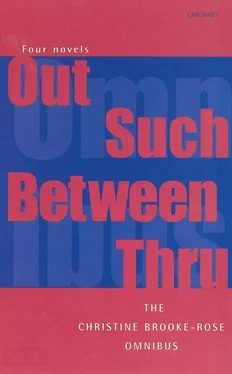Christine Brooke-Rose - The Brooke-Rose Omnibus
Здесь есть возможность читать онлайн «Christine Brooke-Rose - The Brooke-Rose Omnibus» весь текст электронной книги совершенно бесплатно (целиком полную версию без сокращений). В некоторых случаях можно слушать аудио, скачать через торрент в формате fb2 и присутствует краткое содержание. Год выпуска: 2012, ISBN: 2012, Издательство: Carcanet Press Ltd., Жанр: Современная проза, на английском языке. Описание произведения, (предисловие) а так же отзывы посетителей доступны на портале библиотеки ЛибКат.
- Название:The Brooke-Rose Omnibus
- Автор:
- Издательство:Carcanet Press Ltd.
- Жанр:
- Год:2012
- ISBN:9781847775757
- Рейтинг книги:5 / 5. Голосов: 1
-
Избранное:Добавить в избранное
- Отзывы:
-
Ваша оценка:
- 100
- 1
- 2
- 3
- 4
- 5
The Brooke-Rose Omnibus: краткое содержание, описание и аннотация
Предлагаем к чтению аннотацию, описание, краткое содержание или предисловие (зависит от того, что написал сам автор книги «The Brooke-Rose Omnibus»). Если вы не нашли необходимую информацию о книге — напишите в комментариях, мы постараемся отыскать её.
The Brooke-Rose Omnibus — читать онлайн бесплатно полную книгу (весь текст) целиком
Ниже представлен текст книги, разбитый по страницам. Система сохранения места последней прочитанной страницы, позволяет с удобством читать онлайн бесплатно книгу «The Brooke-Rose Omnibus», без необходимости каждый раз заново искать на чём Вы остановились. Поставьте закладку, и сможете в любой момент перейти на страницу, на которой закончили чтение.
Интервал:
Закладка:
The end of the green thermoplastic hose, held downwards with the right hand six centimetres away from the brass nozzle-holder, and with the left hand further away still, pours an imagined jet of water straight at the spot where the strong stem of the laurel-bush comes out of the earth. The pressure of the water in the hose is not strong. It can be made stronger by holding the hose higher, about a metre or more above the plant, so that the jet of water goes straight down into the root, making a slight hole in the dry earth around the strong stem. The earth drinks quickly. It has been baked all day by the hot sun and it is thirsty. A small puddle forms around the laurel-bush. The baby castor-oil plants are next. The hose must be held much closer, the brass nozzle-holder almost touching the earth around each plant but not touching the plant itself. Held at this height, it gives a jet which does not remove or disturb the earth but flows gently into it.
The right hand has jerked. The right arm is a model of still control, and yet the hand that holds the hose six centimetres away from the brass nozzle has jerked sideways, so that the jet, following the movement, has fallen on the delicate reddish stem of the smallest castor-oil plant. The stem has not broken but the plant is uprooted. It is possible, however, to replant it quickly in the now softened earth.
— Conceited, lazy, unreliable. It is an article of faith.
— Ha! You dirty, you need washing. Ha!
— Aaah, sprtch, grrr, brrr, stop, shshtop, prshsh.
— Hee-hee-hee! The laugh is that of a delighted child. You have a heart condition. Symptoms? Verbal diarrhoea, sanguine complexion. Did you know that the dark patches on your cheeks are not flowers at all, but blood, belonging like words to the element of fire, quench it, quick, water, water, help fire. I am a doctor you see. Drench, drench.
The white wall is gently rounded as the road curves, and continues to curve, but almost imperceptibly. It is impossible ever to see whether things are different round the corner. The bougainvillaea clusters over the top of the wall, backed by young palm trees that sway a little in the luminosity of the white winter sky, and the white wall continues to curve along the curving road. It is impossible to tell when the mimosas will come into view. Sooner or later they will flare brightly into view. The red flowers of the poinsettia, or what appear to be red flowers, which will be coming out shortly, are not flowers at all but leaves. Did you know that? Well of course, I am a gardener. Feathery green branches droop down like ferns over the white wall that separates the property from the road, clustered here and there with yellow dots. Beyond the closed wrought-iron gates the mimosas are just beginning to bloom. Sooner or later they will be a mass of yellow. Sooner or later they will be a mass of gold against the post-card blue sky. It is difficult to revisualise the exact degree of blueness in a summer sky, or to re-imagine the exact degree of heat. You may wish to think about it, I’ll let you know. The hot season is not yet with us and much planting remains to be done.
— Yes, well, as a matter of fact I would like to think about it. I hadn’t quite visualised the exact degree of, I hadn’t quite visualised the degree of heat that would be applied. The fire of cosanguinity is excessive. The pressure of the water is low. Pulse diagnosis shows that the plant is uprooted, although the delicate stem has not been actually broken. It would be possible to replant it quickly in the now softened earth.
— Yes, well as a matter of fact I would like to think about it. I hadn’t quite visualised the degree of — servility implied. I am a doctor by training, and although circumstances have, through no fault of theirs, forced many of my countrymen to open the great wrought-iron gates, slowly, by remote control, the plane-trees lining the drive form with their bare and upward branches a series of networks, like a map of the nervous system, that become finer and finer as the drive recedes towards the big house, just discernible through the leaflessness. Beyond the thick network of bare branches there is a finer network, closing in a little over the drive, and beyond that a finer network still. The network of bare branches functions in depth, a corridor of cobwebs full of traps for flies. At the distant centre of the corridor of cobwebs the spider is advancing.
The spider is advancing with sparkling teeth bared in a wide flattened grin that blares white as it catches the luminosity of the white winter sky. Nearer and nearer it smoothly advances, apparently stretching across the whole width of the drive, broadening as the drive broadens, approaching with an engulfing threat to the wrought-iron gates until suddenly the gates dwarf it with their own tall fangs that close slowly behind it as it passes through. A pale blue face floats in a blue glass globe above the wide metallic grin. Beyond it, outlined against more light, more glass and moving fronds, a cavern-blue chin-line curved like a madonna’s and pale blue teeth flashing in wide mauve lips under a wide mauve hat of falling plumes, all of it cut, swiftly, by a shaft of light reflected in the glass, and then away, only a purple blob in a moving bubble of quickly shifting blue and green. The number of the vehicle is 24.81.632. There is no numerical significance in such a number. Beyond the vertical bars of the closed wrought-iron gates there is the thick network of the first plane-trees on either side of — oh hell. The number of the vehicle is, the number of the vehicle, the number of the vehicle is gone. The number of the vehicle is insignificant.
Daily from 8 a.m., at the Labour Exchange, a gnarled left hand lies stretched like a claw on the neighbouring human thigh. A fly straddles the high blue vein that comes down from the middle finger towards the thumb. The vein must seem like a rampart to the fly, unless perhaps the fly has no conception of a rampart, any more than it has of love, and does not even know that the vein is blue. Sooner or later the thumb, or even the whole hand with a flick of the wrist, will twitch the fly away. Sooner or later a group of five names will be called out and the thigh will slope up into a vertical position, slowly or suddenly according to the age and the humour and the health, according to the degree of sanguinity or melancholia, according to the balance or imbalance of hope and despair.
Dear Madam, your head gardener. Dear Madam, in an age of international and interracial enlightenment such as we have been privileged to witness and partake of on this continent since the displacement, it is a shock and a disappointment for me to have to report to you that your head gardener. Dear Madam, you will only know the name at the bottom of this letter through my wife who serves you, and for whom you were kind enough to arrange an interview with your head gardener. And on behalf of whom you were kind enough. And for whom you were kind enough to arrange an interview between me and your. Between your head gardener and. For whom you were kind enough to ask your head gardener to see me with regard to a job. Dear Madam — you will only know the name at the bottom of this letter through my wife, who works for you, and for whom you were kind enough to ask your head gardener to see me with regard to a job, as I understood it, a job presumably as assistant gardener. In an age of international and interracial enlightenment such as ours, the gnarled left hand lies on its side, with the fingers curling in under the stretched out thumb, as if the hand were holding a bunch of flowers or a stemmed glass. The high blue vein from the middle finger curves upwards towards the thumb.
In an age of international and interracial enlightenment such as we have been privileged to witness on our continent since the displacement, the fly moves jerkily on the canvas shoe of the left foot, between the bump made by the big toe and the first hole of the grey shoe-lace. The shoe-lace though grey, is brand new. The blue of the canvas is faded, the shoe is well worn but not in holes. The other shoe, half hidden by the left foot which is crossed over it, may be in holes.
Читать дальшеИнтервал:
Закладка:
Похожие книги на «The Brooke-Rose Omnibus»
Представляем Вашему вниманию похожие книги на «The Brooke-Rose Omnibus» списком для выбора. Мы отобрали схожую по названию и смыслу литературу в надежде предоставить читателям больше вариантов отыскать новые, интересные, ещё непрочитанные произведения.
Обсуждение, отзывы о книге «The Brooke-Rose Omnibus» и просто собственные мнения читателей. Оставьте ваши комментарии, напишите, что Вы думаете о произведении, его смысле или главных героях. Укажите что конкретно понравилось, а что нет, и почему Вы так считаете.












